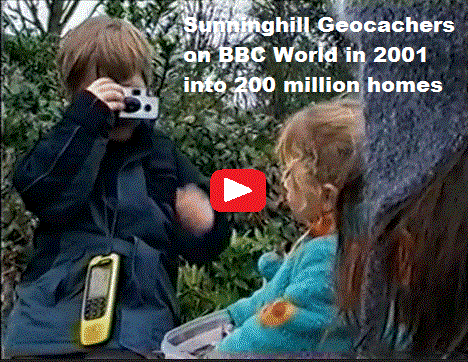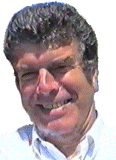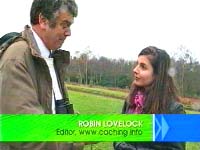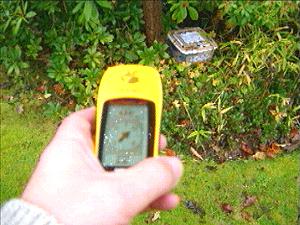



This page provides some more pictures and the "inside story" on the BBC World Television feature on Geocaching broadcast in January 2002. The programme was part of "Click Online" and was broadcast into 200 million homes between 10th until 16th January 2002. BBC World TV cannot be received within the UK, but you can play the video off the BBC World page www.bbcworld.com/Content/clickonline/week02_2002/click_two.asp
 First let me thank Sevan Bastagian, Simon Fox and Simon Hancock of
the BBC for contacting me in the first place,
and putting this great little piece together. It only lasts four minutes,
but has all the important things - including a plug for www.caching.info :-)
I must also thank the Sutcliffe and Bell families for providing our little
TV stars Poppy, aged 3, and Sam, aged 4 - more of them later.
The BBC chose to film in "working hours" which made it difficult for
my local, more experienced geocaching friends to take part, due to their
"day jobs". Sorry to those in the USA who were prepared to give internet
interviews to the BBC - who were obviously pressed on time and finance budget.
There was, as always, a lot of material that never made it to the screen.
Maybe there will be scope for this to appear in a future TV programme somewhere.
I certainly hope we are luckier with the weather :-)
First let me thank Sevan Bastagian, Simon Fox and Simon Hancock of
the BBC for contacting me in the first place,
and putting this great little piece together. It only lasts four minutes,
but has all the important things - including a plug for www.caching.info :-)
I must also thank the Sutcliffe and Bell families for providing our little
TV stars Poppy, aged 3, and Sam, aged 4 - more of them later.
The BBC chose to film in "working hours" which made it difficult for
my local, more experienced geocaching friends to take part, due to their
"day jobs". Sorry to those in the USA who were prepared to give internet
interviews to the BBC - who were obviously pressed on time and finance budget.
There was, as always, a lot of material that never made it to the screen.
Maybe there will be scope for this to appear in a future TV programme somewhere.
I certainly hope we are luckier with the weather :-)

 Some of the pictures were taken during or just after filming on 13th December, and
some used here to illustrate possible future material. e.g. little
Sam on the left is shown hunting that geocache in the hollow tree behind him :-)
On the right you can see a plot of the group's movement, following
Sam, as he led us from Pembroke Lodge, through the woods, to the
cache. The aerial photo was supplied by GetMapping PLC -
www.getmapping.com
Some of the pictures were taken during or just after filming on 13th December, and
some used here to illustrate possible future material. e.g. little
Sam on the left is shown hunting that geocache in the hollow tree behind him :-)
On the right you can see a plot of the group's movement, following
Sam, as he led us from Pembroke Lodge, through the woods, to the
cache. The aerial photo was supplied by GetMapping PLC -
www.getmapping.com

 Filming in Richmond Park would
have been nicer if the weather had been kinder.
Here are Simon Fox, Simon Hancock and Sevan Bastagian working
in appalling conditions.
However, we still managed to grab some "action" between the rain showers.
There was a nice interview with Poppy and Sam, after they found the cache,
but this was not included - probably because by then Sam had the camera....
Filming in Richmond Park would
have been nicer if the weather had been kinder.
Here are Simon Fox, Simon Hancock and Sevan Bastagian working
in appalling conditions.
However, we still managed to grab some "action" between the rain showers.
There was a nice interview with Poppy and Sam, after they found the cache,
but this was not included - probably because by then Sam had the camera....

 These two pictures are from the instant camera that Sam snatched
from the cache, shouting "that's just what I wanted !". His interview was
then interrupted as he shot numerous pictures at point blank range
of Sevan and the two Simons. I have the originals if you want 'em :-)
These two pictures are from the instant camera that Sam snatched
from the cache, shouting "that's just what I wanted !". His interview was
then interrupted as he shot numerous pictures at point blank range
of Sevan and the two Simons. I have the originals if you want 'em :-)

 Jack on the left, my father-in-law, may be the oldest Geocacher at 82.
He too was grabbed for an interview by Sevan on the right.
Jack is recovering well after his attack by a squirrel during the
geocache hunt :-)
Here is a nice picture of Poppy with the presenter Sevan,
taken during a brief break in the dry.
Jack on the left, my father-in-law, may be the oldest Geocacher at 82.
He too was grabbed for an interview by Sevan on the right.
Jack is recovering well after his attack by a squirrel during the
geocache hunt :-)
Here is a nice picture of Poppy with the presenter Sevan,
taken during a brief break in the dry.
Jack was able to see the programme on TV - because the lucky devil took a holiday break in sunny Cyprus :-) The Bells got a call from amazed friends in Spain, and an old friend of mine, who I've not seen for years, contacted me from Belgium.
 On Monday 7th January, Tony Wale went up to BBC TV Centre for his
interviews to be filmed. Simon asked for the "Laptop computer stuff"
including aerial photography, but time prevented it being used.
You can read more about Tony on
www.caching.info
- the web site set up by Tony and Robin to promote the hobby
of Geocaching (rather than particular geocaching web sites). Instead of
plugging his web site, Tony chose the Royal Institute of Navigation :-)
On Monday 7th January, Tony Wale went up to BBC TV Centre for his
interviews to be filmed. Simon asked for the "Laptop computer stuff"
including aerial photography, but time prevented it being used.
You can read more about Tony on
www.caching.info
- the web site set up by Tony and Robin to promote the hobby
of Geocaching (rather than particular geocaching web sites). Instead of
plugging his web site, Tony chose the Royal Institute of Navigation :-)
 Robin got what he wanted - a plug for www.caching.info, although
"Editor" seems rather too grand a title :-) Robin's role, early in the
programme, is a brief few words to Sev explaining what a GPS looks like,
and roughly what it does.
Robin got what he wanted - a plug for www.caching.info, although
"Editor" seems rather too grand a title :-) Robin's role, early in the
programme, is a brief few words to Sev explaining what a GPS looks like,
and roughly what it does.
 Robin's main contribution was to gather the "star players" :
Poppy and Sam were "trained up" early in December in his garden
- where he'd hidden a few geocaches. He already knew, from logs
of visits to his caches, that some of the geocachers were very
young - with dads having their own motives for firing their interest :-)
Motivation is not difficult with young kids - I think the word is "greed".
Poppy, aged only three, had difficulty using the GPS - but was quite
capable of finding the box and taking stuff :-) Sam, at four, is not
yet into reading numbers, but he could happily use a GPS with compass
to guide us to the cache - even though he might not know how far
away it was.
Robin's main contribution was to gather the "star players" :
Poppy and Sam were "trained up" early in December in his garden
- where he'd hidden a few geocaches. He already knew, from logs
of visits to his caches, that some of the geocachers were very
young - with dads having their own motives for firing their interest :-)
Motivation is not difficult with young kids - I think the word is "greed".
Poppy, aged only three, had difficulty using the GPS - but was quite
capable of finding the box and taking stuff :-) Sam, at four, is not
yet into reading numbers, but he could happily use a GPS with compass
to guide us to the cache - even though he might not know how far
away it was.
 The BBC chose Richmond Park for filming because it was relatively
close to their base in BBC TV Centre, and because there was already
a "very popular" geocache there. You can see details of this cache
on www.gpss.co.uk/geocache/gcrp.htm
- which includes pictures from the Richmond Cache camera. Some of
these appeared briefly in the TV programme - I wonder if we will
ever know who some of these people are ? :-) Many were "accidental finders"
due to the cache becoming exposed - but they all wrote in the log book
and took a picture.
The BBC chose Richmond Park for filming because it was relatively
close to their base in BBC TV Centre, and because there was already
a "very popular" geocache there. You can see details of this cache
on www.gpss.co.uk/geocache/gcrp.htm
- which includes pictures from the Richmond Cache camera. Some of
these appeared briefly in the TV programme - I wonder if we will
ever know who some of these people are ? :-) Many were "accidental finders"
due to the cache becoming exposed - but they all wrote in the log book
and took a picture.
Here is some old background material, from before this page became "public" ...
For the scope of what might be covered in a TV programme on Geocaching, please see www.caching.info Here are a few pictures showing material that might be useful as a link between Geocache "indoor" and "outdoor" activity.

 Right now, most geocachers use their desktop PC at home to
print out onto paper the details of the geocache they wish to hunt.
They put the cache latitude/longitude location into their GPS.
They then set out, often armed with little more than their hand-held
GPS and this printout of the cache details.
Right now, most geocachers use their desktop PC at home to
print out onto paper the details of the geocache they wish to hunt.
They put the cache latitude/longitude location into their GPS.
They then set out, often armed with little more than their hand-held
GPS and this printout of the cache details.

 Some Geocachers already take a Laptop with them - particularly
when on holiday or overseas - so they can access the geocaching sites
when needed. If they connect the Laptop PC to their mobile 'phone, they
can do this "in the field", and enter their log report much sooner
- maybe even from near the cache location, and with photographs from
a digital camera.
If the GPS is connected to the Laptop, the locations
of geocaches can be loaded into the GPS.
Some Geocachers already take a Laptop with them - particularly
when on holiday or overseas - so they can access the geocaching sites
when needed. If they connect the Laptop PC to their mobile 'phone, they
can do this "in the field", and enter their log report much sooner
- maybe even from near the cache location, and with photographs from
a digital camera.
If the GPS is connected to the Laptop, the locations
of geocaches can be loaded into the GPS.
 The Laptop can
be used "on the road" to display
your moving position on a map, or aerial photograph.
Cache details, including pictures, can be displayed, and you can be
guided by voice to the next geocache.
Robin's GPS Software does things like this - so that's enough of that :-)
The Laptop can
be used "on the road" to display
your moving position on a map, or aerial photograph.
Cache details, including pictures, can be displayed, and you can be
guided by voice to the next geocache.
Robin's GPS Software does things like this - so that's enough of that :-)
 Coming back to the mobile 'phone, soon many will have GPS positioning
capability due to 911 legislation in the USA, and some mobile 'phone makers are already putting in features
to support geocaching. So with a GPS-'Phone you do not need that seperate
hand-held GPS. Graham Avis, in San Diego USA is Project Manager for the
new Thuraya satellite/GSM/GPS 'phone which has already been used for
geocaching. Maybe Graham will be one of those interviewed.
Coming back to the mobile 'phone, soon many will have GPS positioning
capability due to 911 legislation in the USA, and some mobile 'phone makers are already putting in features
to support geocaching. So with a GPS-'Phone you do not need that seperate
hand-held GPS. Graham Avis, in San Diego USA is Project Manager for the
new Thuraya satellite/GSM/GPS 'phone which has already been used for
geocaching. Maybe Graham will be one of those interviewed.
 You have probably heard of the new generation of mobile 'phones that
have Internet access - so many things done on a Laptop could be done
on the 'phone. e.g. choosing what geocache to search for next,
or logging you visit when you find it - even tracking your position
on a detailed map such as that on the right.
You have probably heard of the new generation of mobile 'phones that
have Internet access - so many things done on a Laptop could be done
on the 'phone. e.g. choosing what geocache to search for next,
or logging you visit when you find it - even tracking your position
on a detailed map such as that on the right.
 Another guy who might be interviwed "on the Net" is George Chung from
San Diego - a very active Geocacher in the USA, where it all started,
and someone who is doing a lot of work "behind the scenes" on the
geocaching web sites and related support software.
Another guy who might be interviwed "on the Net" is George Chung from
San Diego - a very active Geocacher in the USA, where it all started,
and someone who is doing a lot of work "behind the scenes" on the
geocaching web sites and related support software.
Don't forget that visit to www.caching.info for all "the basics" about Geocaching.